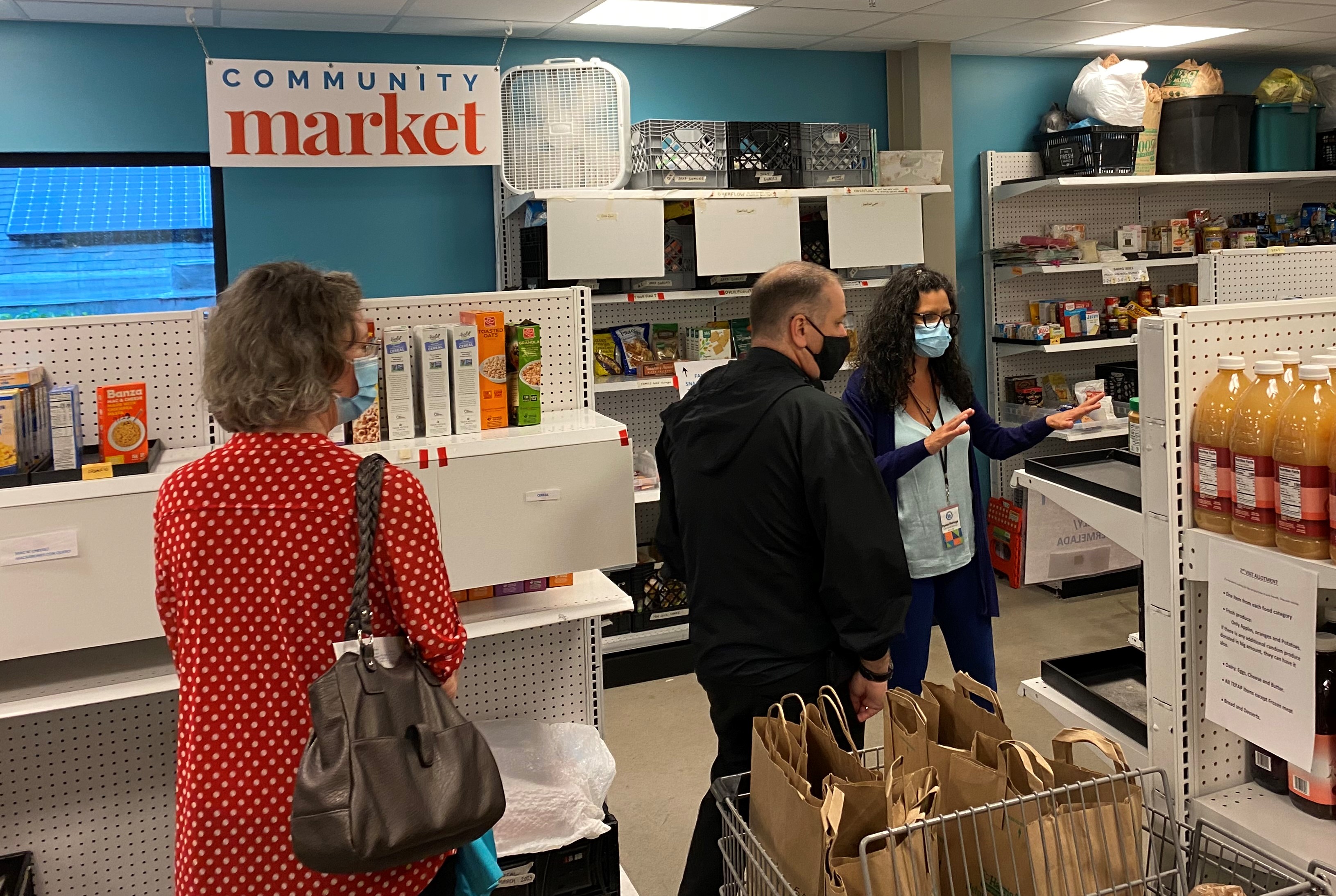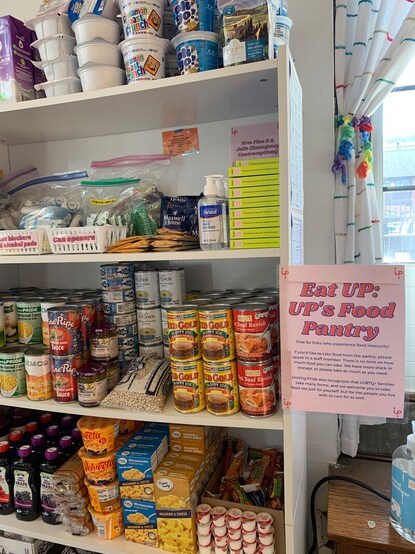How a Food Pantry Can Make a Positive Effect On Your Neighborhood
Food kitchens offer as important resources in neighborhoods, attending to the pushing concern of food instability while promoting a feeling of belonging among locals. The ripple effects of a food kitchen expand past immediate alleviation, reinforcing and affecting regional economic climates area bonds.
Alleviating Food Insecurity

By dispersing food at no charge, food kitchens ensure that vulnerable populaces, consisting of low-income families, children, and the elderly, can fulfill their standard nutritional needs. This access not only addresses appetite however also contributes to boosted mental and physical health outcomes, minimizing the danger of chronic conditions connected with inadequate nourishment. Furthermore, food cupboards commonly work together with local companies to offer curricula, equipping customers with knowledge concerning healthy and balanced eating and budgeting.
The performance of food kitchens extends past plain food circulation; they promote a sense of neighborhood and support - Food Pantry Lockhart. By developing a welcoming environment, these companies help to lower the stigma frequently connected with food insecurity, promoting dignity and regard among customers. Finally, food pantries serve as vital resources in the battle against food instability, considerably improving the top quality of life for lots of individuals and family members
Structure Area Links
The function of food cupboards expands past attending to immediate dietary needs; they likewise work as essential centers for constructing area links. By cultivating an inclusive atmosphere, food cupboards urge individuals and family members from diverse histories to involve and interact with one another. This communication assists dismantle social barriers and promotes a sense of belonging among neighborhood participants.

Food cupboards usually organize events, workshops, and team activities that bring individuals with each other, strengthening social ties and encouraging collaboration. These celebrations offer chances for individuals to share experiences, sources, and abilities, enhancing common assistance networks. As people connect over common difficulties and triumphs, they develop connections that can cause lasting friendships and community uniformity.
Furthermore, food kitchens frequently partner with neighborhood organizations, schools, and services, creating a joint spirit that strengthens area bonds. These partnerships enable an even more extensive approach to resolving not only food insecurity but also other social challenges, thereby boosting the general quality of life in the neighborhood. Basically, food pantries contribute in cultivating connections that equip individuals and cultivate an unified, resilient community devoted to supporting each other.
Sustaining Regional Economic Climates
Neighborhood food cupboards play a critical function in supporting regional economies by sourcing their supplies from local farmers, producers, and businesses. This practice not just strengthens neighborhood ties yet likewise stimulates financial task within the area. By focusing on regional procurement, food kitchens add to the sustainability of small-scale ranches and businesses, ensuring that more funds remain within the area.

In addition, food cupboards commonly team up with neighborhood organizations and programs, which better enhances financial resilience. By taking part in community events and initiatives, they cultivate a culture of support and interconnectedness amongst local stakeholders. Food Pantry Lockhart. On the whole, food kitchens function as a vital link in between those in need and neighborhood economies, producing a ripple effect that promotes financial wellness and stability in the community
Supporting Health And Wellness and Nourishment
Via their necessary solutions, food pantries considerably advertise health and wellness and nutrition within the communities they serve. By providing accessibility to nutritious food reference alternatives, these companies address food instability, which is carefully linked to different health and wellness problems such as excessive weight, diabetes mellitus, and cardio conditions. Food kitchens commonly focus on the circulation of fresh fruits, veggies, whole grains, and lean healthy proteins, guaranteeing that families and individuals receive balanced dishes that support overall wellness.
Furthermore, numerous food pantries offer academic sources and programs that emphasize the significance of healthy consuming. Workshops on dish planning, nutrition education, and cooking demonstrations equip clients to make enlightened nutritional options. This academic aspect not just improves the immediate impact of food support but additionally cultivates long-lasting health benefits.
Urging Volunteerism and Interaction
While numerous community participants may be not aware of the extensive impact they can have, volunteering at food pantries cultivates a solid sense of involvement and uniformity within areas. By joining food cupboard operations, volunteers not just add to minimizing cravings but also develop purposeful relationships with fellow community participants. This engagement grows a network of assistance that expands past the cupboard, enhancing social ties and promoting a society of partnership.
Offering at food kitchens uses people a chance to gain useful skills, such as synergy, leadership, and efficient interaction. These experiences can boost personal development and professional development, while all at once instilling a sense of objective. Additionally, volunteers commonly Discover More act as ambassadors for their communities, increasing understanding about food instability and motivating others to obtain entailed.
Urging volunteerism at food kitchens can lead to enhanced neighborhood participation in different efforts, thus enhancing the favorable influence of the cupboard itself. As more people take part in volunteer chances, the collective initiatives can produce systemic adjustments, attending to source of food insecurity and promoting a much more resilient community. Ultimately, the act of volunteering comes to be a catalyst for more useful site comprehensive area participation and empowerment.
Verdict
In final thought, food pantries act as vital sources that not only reduce food instability however additionally reinforce neighborhood bonds and promote health. By giving healthy food, cultivating social connections, and supporting local economic climates, these organizations add to an extra resistant and involved community. Furthermore, initiatives that urge volunteerism and education and learning on health and wellness and nourishment empower people to make enlightened choices, inevitably producing a positive and enduring influence on the general top quality of life within the area.
Food pantries offer as important resources in neighborhoods, resolving the pressing problem of food instability while fostering a sense of belonging amongst locals.By dispersing food at no expense, food pantries make certain that at risk populations, including low-income families, children, and the elderly, can meet their basic dietary requirements.The effectiveness of food kitchens prolongs beyond plain food distribution; they foster a sense of neighborhood and assistance. In conclusion, food pantries serve as vital sources in the fight against food insecurity, significantly improving the quality of life for many people and family members.
In conclusion, food cupboards serve as important sources that not only alleviate food insecurity however likewise reinforce neighborhood bonds and promote health.